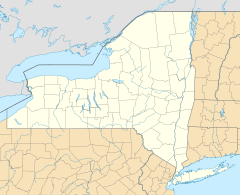Flint Creek (New York) facts for kids
Quick facts for kids Flint Creek |
|
|---|---|
|
Location of the mouth of the Flint Creek in New York State.
|
|
| Country | United States |
| State | New York |
| Region | Finger Lakes |
| Counties | Ontario, Yates, Steuben |
| Physical characteristics | |
| Main source | Prattsburgh, Steuben County 42°33′34″N 77°18′49″W / 42.55944°N 77.31361°W |
| River mouth | Canandaigua Outlet Phelps, Ontario County 42°57′39″N 77°02′58″W / 42.96083°N 77.04944°W |
Flint Creek is a cool waterway in the Finger Lakes area of New York State. It flows between two big lakes, Canandaigua Lake and Seneca Lake. This creek is part of a larger water system called the Oswego River drainage basin. All the water from this basin eventually flows into Lake Ontario.
Flint Creek starts from two small springs in a place called Italy. These springs meet up in Italy Valley. The creek then flows through small towns like Potter, Gorham, and Seneca Castle. Finally, it reaches the village of Phelps, where it joins the Canandaigua Outlet.
Contents
History of Flint Creek
The Iroquois people, who lived in this area long ago, had special names for Flint Creek. They called it Ax-o-quent-a or Ah-ta-gweh-da-ga. The name Ah-ta-gweh-da-ga means "flint stone". This name came from the language of the Cayuga or Seneca tribes.
Early Settlements and Mills
In the early 1800s, the small town of Gorham grew up around Flint Creek. People built several mills there. These mills used the strong flow of the creek to power their machines, helping the town grow.
Farming in the Muckland Area
A very large area of special soil called muckland was created along Flint Creek. This happened when people cleared and drained a swamp in the town of Potter. This rich muckland is perfect for growing vegetables. Flint Creek flows right through the middle of this area and its water is used to help irrigate the crops. A big part of this muckland is farmed by Torrey Farms, a large farm from Elba.
Fun Activities on Flint Creek
A section of Flint Creek, known as Phelps Run, is a popular spot for exciting water sports. People enjoy whitewater rafting and kayaking here.
Whitewater Rafting and Kayaking
Phelps Run has different levels of rapids, from easy (Class II) to more challenging (Class III and IV). This part of the creek is about 3 miles (4.8 km) long. The water drops about 50 feet for every mile it flows, which creates the exciting rapids.
 | Jewel Prestage |
 | Ella Baker |
 | Fannie Lou Hamer |



